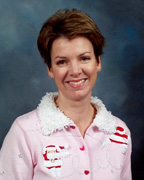Diagnosing cancer genetically is an intricate process, where noticing the rearrangement of just a few chromosomes may determine the type of cancer and – in the future – the cancer’s treatment.
Julia Bridge, M.D., isn’t only familiar with that process; she’s drawing the standards for the rest of the world to follow. 
Dr. Bridge is a professor in three departments at UNMC – pathology and microbiology, pediatrics and orthopaedic surgery. For years, she has produced pioneering research discoveries on bone and soft tissue tumors. By examining the chromosomes of more than 4,000 tumor samples, she and her team of researchers have mapped descriptions of more than 25 recurring abnormalities in tumors. In recognition of these contributions, she received the prestigious Kappa Delta Ann Doner Vaughn Award from the American Academy of Orthopaedic Surgeons in 1999.
“Dr. Bridge’s research has earned her a reputation as one of the leading cytogeneticists in the world,” said Samuel M. Cohen, M.D., Ph.D., chairman of the department of pathology and microbiology. “She was one of the first researchers ever to take an interest in bone and soft tissue tumors and what she’s found has revolutionized how tumors are diagnosed. Textbooks are being revised, the standards for cancer diagnosis are changing and pathologists have an easier, more exact way to make diagnoses – all because of Dr. Bridge.”
In April, her expertise earned her a spot at the editorial consensus meeting in Lyon, France, to establish the new World Health Organization Classification of Bone and Soft Tissue Tumors. Dr. Bridge was one of six geneticists in the world, and only one of two from the United States, to be invited to the conference, at which the group established diagnostic criteria and classifications to facilitate uniform tumor diagnosis throughout the world. The standards they drew will be published in September.
“Board certification in pathology and clinical cytogenetics is a rare combination. This background has helped me view cancer from a different perspective,” Dr. Bridge said. “The identification of tumor-specific genetic abnormalities in bone and soft tissue tumors has dramatically altered the clinical care of patients with these malignancies and additional changes are anticipated in the future. It has been very rewarding to see genetic approaches developed in the research laboratory implemented as routine assays in the clinical diagnostic laboratories. This transition has been a team effort.”
Dr. Bridge became interested in genetics while an undergraduate student at the University of Nebraska-Lincoln and a medical student at UNMC, where she worked with geneticists Bruce Buehler, M.D., and Warren Sanger, Ph.D. After graduating from UNMC in 1984, she started her research on bone and soft tissue tumors at the University of Kansas Medical Center in Kansas City, Kan., during her residency in the department of pathology.
“I was particularly interested in bone and soft tissue tumors because radiographically and histologically many of them look the same or are very similar, so establishing an accurate diagnosis is often a challenge,” she said. “I thought that if new classification markers could be found for these tumors, it would impact patient care significantly.”
While at KU, she kept her ties to UNMC by sharing lymphoma samples with her former mentor, Dr. Sanger. She returned to UNMC in 1991 after a molecular biology fellowship at the Southwest Biomedical Research Institute in Scottsdale, Ariz., under the direction of Dr. Avery Sandberg.
Since 1985, Dr. Bridge’s findings have been published continually as she maps new genetic abnormalities in bone and soft tissue tumors. Over the last two years, Dr. Bridge has been asked to develop and direct a full-day molecular genetic course to educate pathologists in this field at the United States and Canadian Academy of Pathology annual meeting. Most recently, through the guidance of UNMC Chancellor Harold M. Maurer, M.D., her laboratory was selected to be the Cytogenetic Reference Laboratory for the National Children’s Oncology Group (C.O.G.) study for soft tissue sarcomas.
“Oncologists and pathologists are eager for this information,” Dr. Bridge said. “The genetic markers for bone and soft tissue tumors are not only a parameter of crucial value in the diagnosis of these lesions, but many are also of prognostic importance. Ultimately, the genetic findings may dictate how therapeutics are given.”
Dr. Bridge’s research isn’t limited to bone and soft tissue tumors. Her laboratory has researched breast cancer and bladder cancer, specifically new molecular cytogenetic approaches to diagnosis, prognosis and patient follow-up. For example, her laboratory was instrumental in achieving FDA approval of the Her-2/Neu assay (Oncor, Inc.) for assessment of gene amplification in breast cancer and the UroVysion assay (Vysis, Inc.) for the clinical diagnosis and follow-up of patients with urinary bladder cancer.
Most recently, she has been invited to participate in the development of a promising automated analysis system for molecular cytogenetic assays. And she’s in good company: the Mayo Clinic and a laboratory in France have been the only other research laboratories invited to participate on similar research.